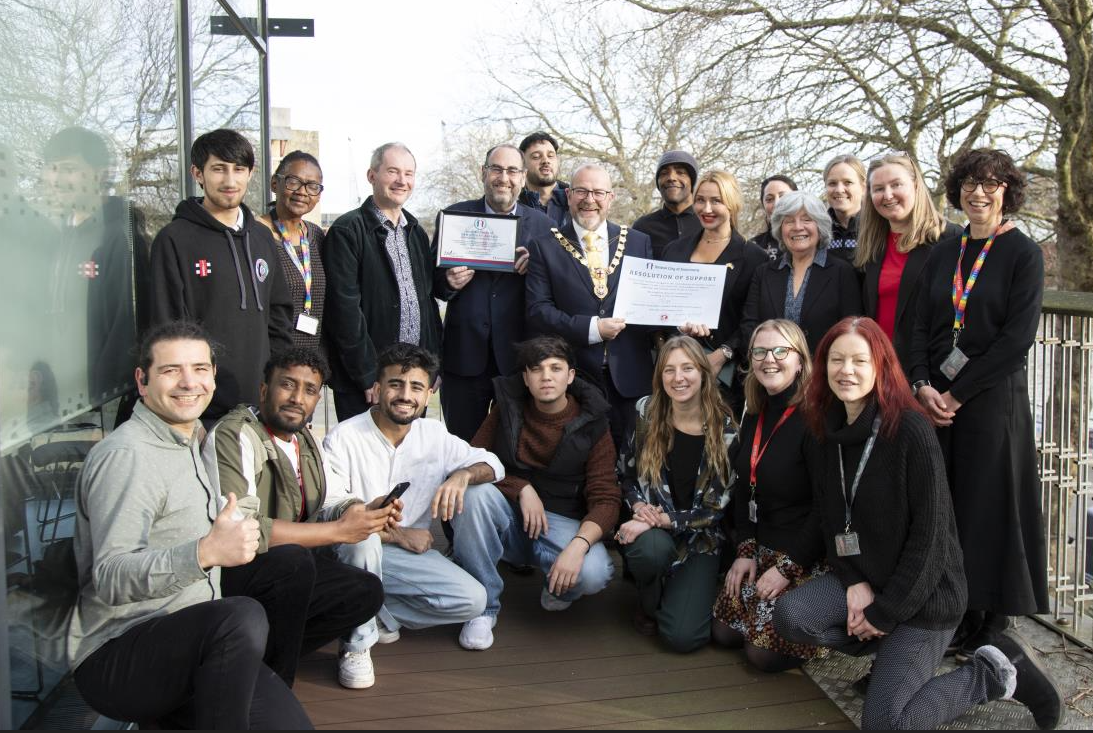Is Bristol really a City of Sanctuary?

Bristol celebrated its reaccreditation as a City of Sanctuary in Feb 2025.
As we enter another weekend of people talking about Protests and Counter Protests, and whether Bristol is a welcoming place for refugees, I thought it might be helpful to look at what the available data tells us about this topic.
The data used in this article is sourced from Gov.uk
Core Cities Comparison
Bristol is one of the 12 Cities in the "Core Cities UK" group.
Homes for Ukraine
Bristol is the most welcoming of the Core Cities, taking in 1,009 people which is 0.2% of our population.

Afghan Resettlement
Bristol is the 2nd most welcoming Core City for people in the Afghan Resettlement Scheme, taking in 433 people (0.09% of population).

Supported Asylum
Bristol is 8th (out of 12) when it comes to welcoming Asylum Seekers, taking in 1,188 people (0.24% of population).

Totals
When you add these 3 groups together Bristol comes 6th out of 12. Not as welcoming as Glasgow, but much more welcoming than Edinburgh.

It is interesting that we have got Scottish cities in the first and last position in the table. Are people in Glasgow really more than twice as welcoming to refugees than their fellow Scots in Edinburgh?
Glasgow and Edinburgh
Historic policy choice: Glasgow volunteered for the UK’s asylum “dispersal” scheme in 1999 and, for over two decades, it was Scotland’s only designated dispersal area. That meant the Home Office routinely placed people there while their claims were decided, creating a big legacy population.
How placements work: People aren’t free to choose a city—Home Office contractors (formerly Serco, now Mears in Scotland) place them where they have accommodation under national contracts. Those providers built up most of their Scottish housing and support capacity in Glasgow, so more people go there.
Housing availability & cost: Dispersal relies on finding relatively affordable, available housing at scale. Glasgow historically had more of that than Edinburgh (where rents and social housing pressure are higher), so contractors concentrated stock and services in Glasgow. (This is reflected in Glasgow City Council evidence that it was the sole Scottish dispersal area and developed extensive expertise.)
What’s changing now: Since 2022 the UK moved to “full dispersal”, expanding placements to other Scottish councils (including Edinburgh) and using hotels as contingency—so Edinburgh now has some, but numbers are still far smaller than Glasgow’s. Recent figures highlight the gap (about 58 per 10,000 residents in Glasgow vs ~3 in Edinburgh).
Nottingham and Bristol
Nottingham is 2nd in the table and Bristol is 6th. Are people from Nottingham more welcoming than people in Bristol?
Because the Home Office decides where to place people while their cases are processed, and Nottingham simply has more of the kind of accommodation the Home Office (and its contractors) can get hold of—mainly cheaper private rentals and HMOs—than Bristol.
In Nottingham’s region the AASC contract is run by Serco, which covers the Midlands & East and secures large portfolios of private rental “dispersal” properties. Placement numbers end up being highest where providers can rent enough homes at viable prices—typically cities with lower rents and more HMOs like Nottingham.
Bristol has tighter and pricier housing. Bristol City Council’s own snapshot (Aug 2025) shows 1,327 asylum seekers in the city—most of them in three hotels—reflecting the difficulty of sourcing regular dispersed housing there. By contrast, Nottingham’s public health JSNA shows a larger flow/history of supported asylum seekers (about 1,550 in Sep 2023), and most were already in community (dispersal) housing rather than hotels.
The Home Office prioritises community dispersal because hotels are expensive stop-gaps; availability of suitable rentals—and local landlord/council willingness—therefore drives local totals. Areas where providers can line up more ordinary housing will host more people.
Bristol Asylum Exclusion
The number of asylum seekers being hosted in the core cities is mainly driven by the availability and cost of housing, not the attitudes of the councils or residents. You could argue that Bristol is less "welcoming" than many other Cities by virtue of the high cost of housing. So as more students and professionals choose to move to Bristol to live, they are inadvertently making it a less welcoming place for refugees by contributing to the rise in house prices.
Bristol Beacon
The BB published this statement today.
Is this a form of virtue signaling? Are they implying that venues that do not make these type of pronouncements could be considered as "far right racists"?

BB does offer free music lessons to "Primary and Secondary aged children who identify as refugees and/or asylum seekers".
It also offers these bursaries and discounts to:
- Pupil Premium students
- Care Experienced Young People
- Those with Educational Health Care Plan (EHCP)
- Those learning an endangered instrument
- Low-income families
How can you help?
Instead of going on a counter demo in the centre, or labelling people who are concerned about immigration as "far right racists" on facebook, why not do something practical to help refugees in Bristol?
If you are a Bristolian who wants to support refugees in our city, then you could help out by donating some money to "The Bristol City of Sanctuary Transport Fund".
We have partnered with First Bus to provide free bus tickets for people seeking sanctuary in our city, who would otherwise not be able to access vital services and appointments. In 2024 we raised £7307 and we provided 8640 free tickets for destitute asylum seekers. We are in constant need of additional funding to keep this community initiative alive and really welcome your generous donations.
Bristol is a big city and a lot of the important services for people seeking sanctuary are located centrally. This means many asylum seekers are forced either to walk for miles or to spend nearly all their allowance on bus tickets over essentials such as phone credit to speak with family members, printing costs for legal documents or suitable clothing.
Many of the people who benefit from our Sanctuary Transport Fund are destitute. Destitute asylum seekers have lost all their housing and financial support. They are not allowed to work and cannot return to the country they fled.
Alongside this, many of the people who receive the tickets are people who are required to sign at Patchway for immigration reporting. Without our tickets, they would have to walk over 5 miles to get to the station. The fund also reaches vulnerable refugees who are living on the outskirts of the city and who may have access needs that make it hard to travel into the centre of Bristol.

Comments ()